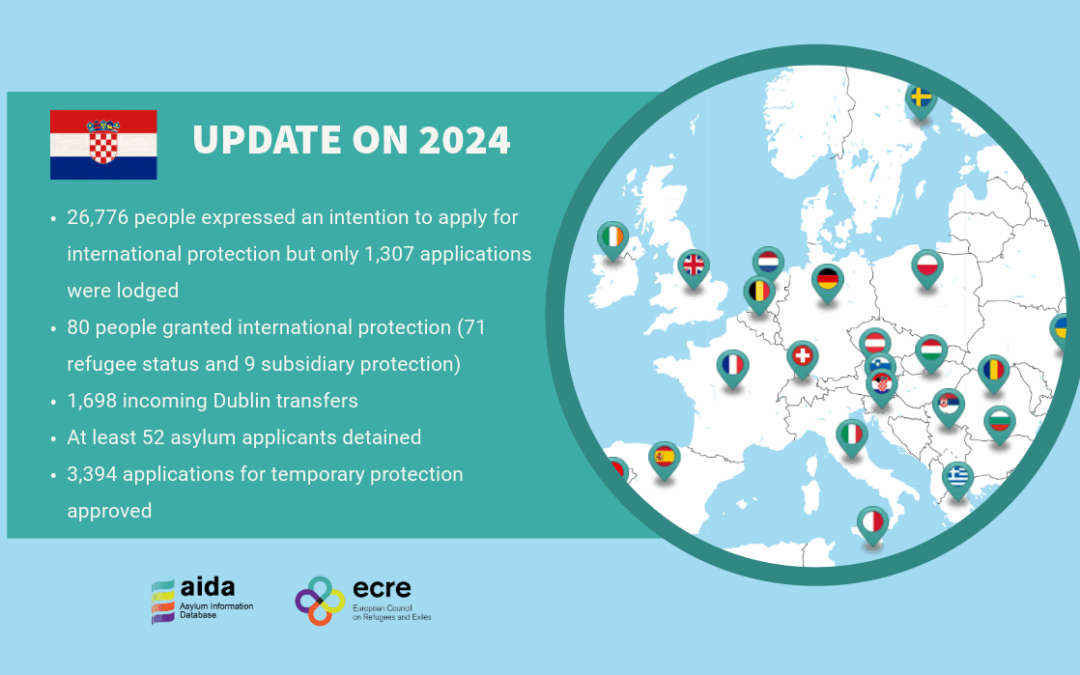The updated AIDA Country Report on Croatia provides a detailed overview on legislative and practice-related developments in asylum procedures, reception conditions, detention of asylum applicants and content of international protection in 2024. It is accompanied by an annex which provides an overview of temporary protection.
A number of key developments drawn from the overview of the main changes that have taken place since the publication of the update on 2023 are set out below.
(A) International protection
- Legislative changes: Several new laws related to the asylum and temporary protection procedures were adopted in 2024. Among the intended goals were: modernising administrative dispute proceedings, encouraging a more proactive role of courts in case resolution, reducing the duration of administrative disputes and increasing legal certainty for the parties. Notably, the new legislation explicitly provides that in administrative disputes, courts must also base decisions on the EU acquis.
Asylum procedure
- Access to the territory: The Ombudswoman reported a decrease in the number of complaints about pushbacks in 2024. However, several NGOs reported that these practices persisted.
- Statistics: According to the Ministry of the Interior, 26,776 people expressed an intention to apply for international protection in 2024 but only 1,307 applications were ultimately lodged. However, according to the Ombudswoman, 1,419 applications were lodged. Of the 359 applications that were decided on the merits in 2024, 279 were rejected and only 80 resulted in the granting of international protection. The procedure was suspended in the cases of 15,338 applications.
- Dublin procedure: Croatia received 1,698 incoming Dublin transfers in 2024. The main countries of origin were Germany (514), Switzerland (348), Austria (249) and France (215). Many of the people who were transferred arrived in extremely poor physical and mental health and without medical documentation, and this posed significant challenges for the institutions and NGOs that provide support.
- Procedure for granting international protection: Croatia temporarily suspended the processing of applications from Syrian nationals at the end of 2024. The people whose applications were suspended continued to have the status of applicants.
Reception conditions
- Reception centres: Complaints about accommodation conditions continued throughout 2024. According to information from the Croatian Red Cross, a large number of asylum applicants stayed in the Reception Centre for Applicants for International Protection for just a few days and some stayed for under 24 hours. 498 applicants were accommodated in social welfare institutions outside this centre.
Detention of asylum applicants
- Restrictions on freedom of movement: The Service for the Reception and Accommodation of Applicants for International Protection issued 52 decisions on restrictions of freedom of movement with a measure of detention in 2024. However, decisions can also be issued by the police, so the total number may have been higher.
Content of international protection
- Inclusion: Although the previous integration action plan expired at the end of 2019, no new plan has been adopted. At the local level, a co-operation agreement between the City of Zagreb and UNHCR Croatia was signed in September 2024, and the Welcome Center (One Stop Shop) was opened in Zagreb with the support of the United Nations Refugee Agency (UNHCR). The centre is intended to serve as a central information point for asylum applicants, beneficiaries of international or temporary protection, and foreign workers with residence and work permits.
(B) Temporary protection
- Legislative changes: A public consultation on the ‘Proposal of the Law on Amendments to the Law on International and Temporary Protection (LITP)’ was launched in December 2024. The proposed amendments relate to the duration of temporary protection under the current LITP, with the aim of revising the three-year limit to the maximum duration that was established under EU law, following the Council of the EU’s decision to extend it until March 2026.
The full report is available here and the annex on temporary protection is available here.
For more information about the AIDA database or to read other AIDA reports, please visit the AIDA website.

